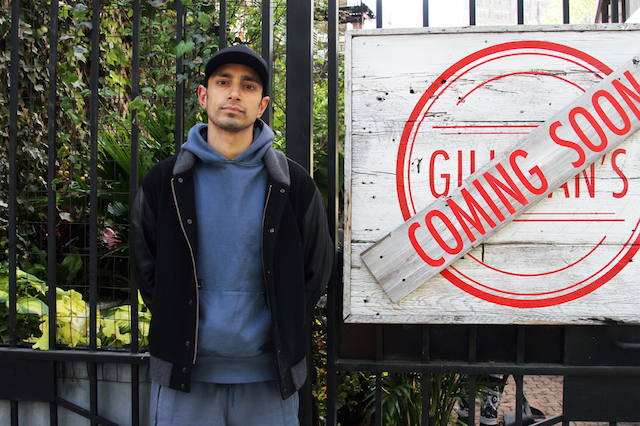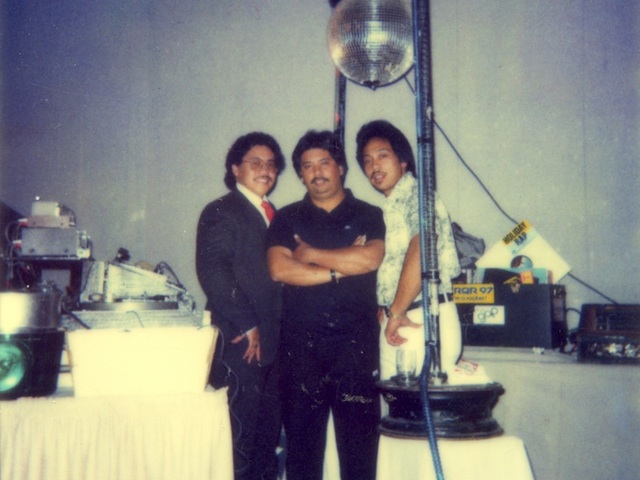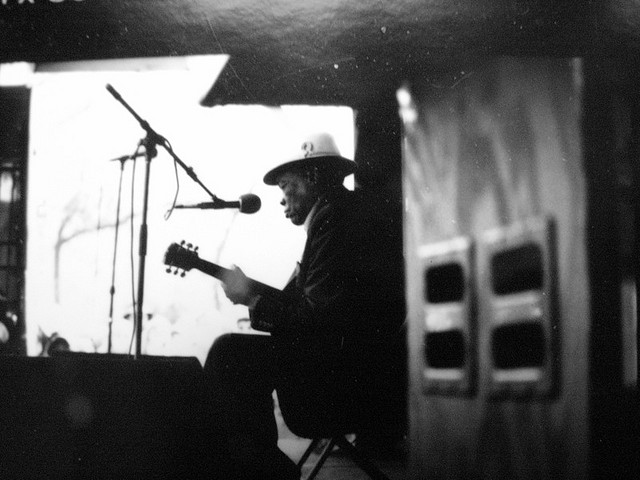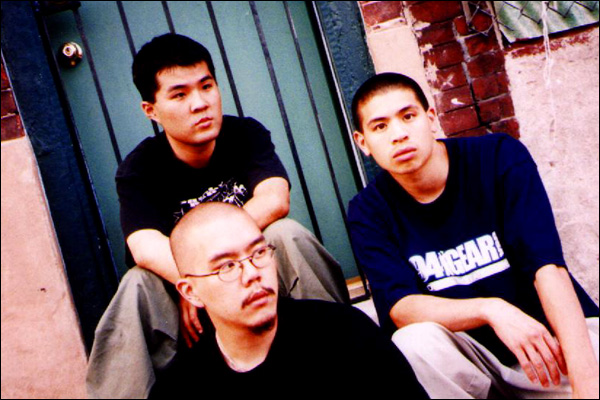‘The Night Of’ star Riz Ahmed talks to Ashok Kondabolu about cricket jerseys, patriotism, acting while brown, and race in the UK.
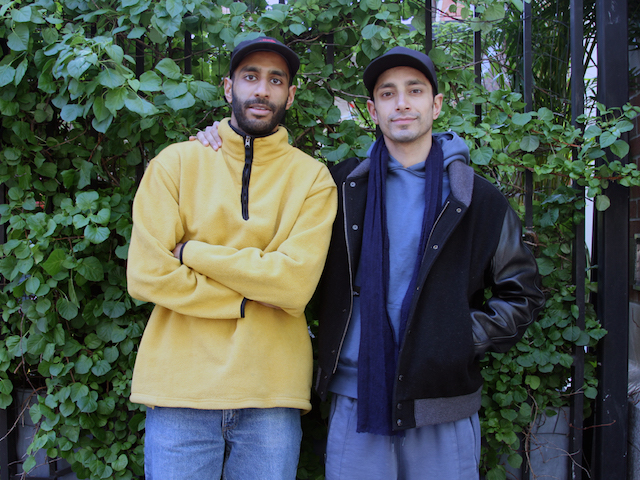
August 25, 2016
I met Riz Ahmed three years ago when he invited me to the Tribeca Film Festival premiere of The Reluctant Fundamentalist, in which he stars. Afterward, we hung out at a hotel bar I can’t remember and his co-star Kate Hudson talked about her son learning to play drums and Kiefer Sutherland mumbled a couple of things I couldn’t understand while smiling. I was into it.
Riz, who is also a rapper and released a new mixtape, Englistan, this summer, was recently in town to promote The Night Of, the HBO hit mini-series which wraps up with it’s eighth and final episode this Sunday. I met up with him at the Soho Grand less than two hours before his flight back to the UK to talk about film, music, cricket teams, and a handful of other things while drinking lemon-ginger tea.
Ashok Kondabolu: I’m in Soho with Riz Ahmed on Mother’s Day.
Riz Ahmed: American Mother’s Day.
American Mother’s Day.
The British celebrate their mothers on a different day.
And South Asian Mother’s Day is constant. So what are you doing on this trip to New York?
I was here for the screening of that HBO show, The Night Of that was shooting when I came and linked up with you and your brother a couple of years ago. The show had a screening at the Tribeca Film Festival of its first episode, which will air officially in July in the United States. So I was here for that and then I stayed out to do a shoot for a new Netflix show.
What’s the Netflix show about?
It’s called The OA, but I’m not really allowed to say anything other than that. It’s really unique, I have to say. I think it’s really imaginative, and there’s a great team behind it: Brit Marling and Zal Batmanglij and Plan B (the production company with Netflix).
I know The Night Of has been in development for a while and there have been a bunch of changes. Can you talk about that a little bit?
Yeah, I mean, initially the project was a British project that was made by the BBC and then when the head of BBC drama at that time moved over to BBC America, she thought maybe we can make an American version of the show with HBO. James Gandolfini was on board initially to play one of the leading roles, but after we showed the pilot sadly he passed away, which means the whole project went into a kind of no man’s land. No one was really sure what was going to happen with it. And then eventually we developed it. It took years, though. We showed the pilot in the fall of 2012. It feels like a big part of my life.
I always felt, with my living experience, that South Asians in the UK might have less of the identity crisis that South Asians in the United States have because of the long history of colonialism and geographical proximity. Have you found that to be true?
I’m fascinated with how different societies deal with multiculturalism. I was in Brazil where you’ve got a massive Japanese and Lebanese community there. But Japanese people there were still calling me ‘gringo.’ [laughs] So it’s crazy, it’s really interesting. But I kind of feel like it’s quite a different experience because generally speaking, and obviously this is a massive generalization, the South Asian experience in the United States is slightly more middle-class than the experience in the UK. I think the position of Latinos is maybe more a parallel with the position of South Asians in the UK, both in terms of socioeconomic position, and not being as middle-class, and also in terms of how much their culture has been instrumental in shaping the “host” societies and cultures. I think the same could be said about South Asians in the UK.
I feel like in the United States, ultimately everyone is like, ‘I’m American,’ because everyone is from somewhere else. So in a way I feel like that’s slightly less of an identity crisis. The idea of American and American-ness is a very elastic one—it is by definition porous and built on migrants and migration, whereas in the UK it’s more like the idea of Europe was founded on the idea of not being the Arabs, not being the people in the global South. So that presents more of a challenge, theoretically, like how do you square the idea that I am British, that I am European? And I am. I’m not agreeing with that perspective, I’m just saying that the foundational myth of Europe is one of not being ‘those’ dudes, not being us dudes. Whereas in America, even the last guy who turns up off the boat is American. Growing up it took me a long time to say I was British. It took until the 2012 Olympics. That was the moment when I thought, yeah I want to stretch this flag and so it’s big enough for me and people like me, rather than viewing it in the way I had my whole life, which was as a symbol of xenophobia and racism, because that flag had been co-opted by racists. That’s kind of how I see it—but I guess the grass is always greener on the other side. On the flip side, in the UK, we’ve got proper multiculturalism unlike the assimilationist imperative in America. In London, you can feel like you’re in a different country from one neighborhood to the next.
I’ve only ever worn or interacted with the American flag either disdainfully or usually in an ironic way. Like I’m wearing a hat with a screaming bald eagle on top of an American flag which I can’t imagine has meaning for anybody, but I think that might just be a New York thing.
You’d be surprised, I recently did a road trip through the Navajo nation in Arizona and it was wild because their relationship to American-ness is intense, man. On one hand they’re like yeah, we’re the original Americans and this country’s great now, and on the other hand “fuck America” because people just don’t have running water or electricity out there and have to go through 10 different permits just to build a two story structure or to start a business. It’s a very strange kind of paternalistic relationship they’ve got with the American government. I talked to this one kid whose grandfather was one of the Navajo code talkers. They were recruited by the marines and were instrumental in winning World War II when the United States was fighting the Japanese in the Pacific. The Japanese did not have access to any people who could translate Navajo. And the Navajo are proud of that. But the American flag is loaded with some kind of emotional reaction for everyone in the world right now. It means lots of things to everyone. No one doesn’t have an opinion on that symbol.
Is auditioning for roles as a South Asian in the US different from in the UK in terms of roles and what’s expected of you?
I think that it has slowly changed everywhere. I also think this stuff works in stages—at the first stage you’ve got stereotypes—cab driver, terrorist, or whatever. Stage 2 takes place on ethnicized terrain but is challenging those stereotypes. When I started out you had Road to Guantanamo, which is about guys who are in Guantanamo Bay and it’s about the War on Terror, but from their perspective and how they were innocent. Four Lions takes place on that terrain, but it’s a satirical comedy about terrorism that humanizes the people that we usually demonize. So we kind of flip the script but still on that terrain. In stage 3, you’re just a dude. You could be called Rajid, you could be called Bob, you could be called David, and that’s kind of exciting. I don’t mean to say that the Holy Grail is one where I’m deracinated and my name is just Tom. But you look at Woody Allen and so many of his films are about New York Jews, but no one thinks about them as marginal stories. You think, ‘That’s a story that deserves to be center stage.’ I guess that’s what we’re working toward.
What is the Englistan mixtape about?
I’ve got to be honest, I recorded that mixtape about two years and I didn’t put it out for a variety of reasons, partly just because of management paralysis and labor fuckeries of the industry; it was a weird one because I’ve recorded it and well, it was political. So I basically had to sit and wait and think about it, and I can’t sit still so I just recorded another album. And now suddenly it’s even more confusing ’cause now there are two fuckin’ albums. And then I started recording the Sweatshop Boys album, and now we’re sitting on three. I think part of the reason why I put it out is what we were talking about. You internalize this notion that your story is a marginal one, and that if you really explore the specificities of your experience, what you create won’t be universal. And I just thought man, ‘I’m just gonna put it out, whoever connects with it does.’ The stuff that you think is really specific to you is the stuff that really transcends and becomes you, and it’s wild because I had kids hitting me up from the Brown diaspora, Middle Eastern kids, but also White working class kids. Even a British soldier hit me up the other day thanking me for putting it out. And to answer, directly, your question: the Englistan mixtape is about stretching the flag. It’s about celebrating our hybrid identity. We all have some kind of hybrid identity in this globalized world, and I think we should celebrate this identity without apologizing for it, without censoring it.
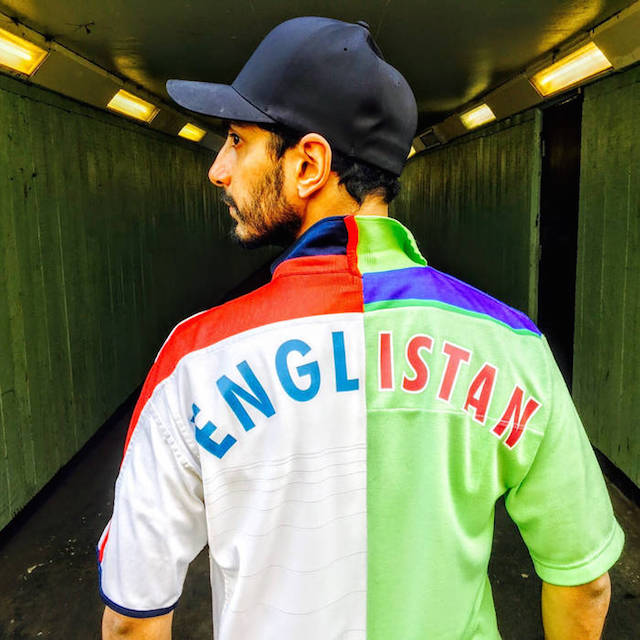
You’re wearing—are those soccer or cricket jerseys?
They’re a mixture actually, so I had this shirt made, it’s a cricket jersey from the Pakistan 1992 World Cup-winning cricket team, led by Imran Khan. It’s mixed with the England Euro-96 cricket shirt. In my lifetime those were the high points for those two teams.
You said in a Guardian interview, “If you are an artist of color sometimes America represents more opportunities. I think film in the UK has a little catching up to do.” Can you clarify that a little bit?
I think that is the case. Ultimately the UK has played quite a conservative game in exporting tried and tested material, and that tried and tested material which the UK has unique access to and which sells well overseas is period drama. Like historical drama, people in bonnets and wigs, running around lawns. That’s great and there’s a place for that. The double irony is that Blacks and South Asians have been in the UK for hundreds of years, so we should be able to be in those films too, but that’s not what sells, that’s not the package. It’s a big problem, and has hampered the inclusivity of our creative industries for a long time.
I feel like the US is a lot more segregated—a lot of US cities I find are quite segregated in terms of the way housing is planned. I tend to see fewer interracial relationships than I see in the UK. But American sells a myth of itself that is the flip of that, a myth that the country is a total melting plot, whereas in the UK Sadiq Khan getting elected as mayor of London is like meh, that’s not even a thing. I know that took a long time to happen because of the political system, but people aren’t like oh shit! Brand new world! People are like ‘Yeah, that’s about time.’
I saw someone tweet angrily imagining a Christian mayor ruling a Muslim city, and I was like dude, history of the world.
Yeah, exactly, give them a history book. I guess the image that America projects is more inclusive and more progressive so I have to kind of commend that. I don’t know why the British fantasy is one where people like me don’t exist. Maybe I should just take the hint and bounce and come and live here. [Laughs] I guess a lot of people do. You see a lot of artists of color moved out here for that reason and I think it’s also because there’s a creative class of people of color that doesn’t exist in the same way in the UK.
Do you think that, when you were younger, you would constantly look to the US for inspiration musically? Has that reversed or is that no longer true?
Well, I always grew up thinking that UK hip hop has got habits taken from our unique history, which is of electronic music and soundsystem culture. When garage rhyme came about I was really excited by that. But I never felt like I was part of the grime scene. I never really belonged to any scene; I kind of pride myself in that perversely although it doesn’t really help in terms of moving your career forward if you’re just this free-flowing outlier. But yeah, I’ve done rap battles, I’ve done garage raves and jungle raves, and hip hop nights, and spoken word. I’ve done a bit of everything, so I’d never say that I’m part of the grime scene, but of course it influenced me.
To be honest I was MCing before grime came about, so my name is a really old-fashioned one—like Riz MC, that’s what MCs were called in the early 90s, that’s when I named myself and I just hold onto that and hold onto that history. Being from the UK we’re not rappers, we’re MCs. It’s interesting to see grime blow up here, I think it’s partly because EDM has blown up here. I think we needed to introduce Americans to raves first.
I remember when I was a kid I went to maybe two raves ever very early on in high school.
I’m not saying that people never raved in the US, but maybe it doesn’t have as much of a center stage in the culture the way it does in Europe.
Can you tell me about Daytimer, the film you wrote and directed?
We were talking about code switching, and that working class background, and the White aspirational private school thing, and the Asian street culture thing, and just kind of pinballing between those trying to find where your center is. That’s a theme that’s defined a lot in my life up until my mid to late 20s. I just wanted to explore that and embrace the specificity of that experience.
I think it’s weird in a way because being brown, being South Asian in America has not been thought of as cool traditionally because it’s predominantly a middle class experience, or you’re the math geek, or all that shit. In the UK there’s more awareness that you can meet some goons that are on that tip. It’s potentially seen as having street cred attached to it. But because America sets the agenda globally, being Brown has never been seen as being potentially cool.
Do you plan on directing one of the features? This is a generic question.
Yeah, for sure, I am. I’m writing a TV series now that I hope to direct on similar themes. So we’ll see how that goes.
You’re involved in two iterations of now classic franchises—the Bourne Series and Star Wars. Does that come with a lot of burden or expectation on yourself?
If I was playing Jason Bourne maybe I’d feel that, but as I’m not it just feels cool to be involved. I’m working with good people and learning a lot as well. I’ve basically just done indie films the whole 10 years of my career, and I’ve been really lucky that some of them have been standing the test of time. Doing these bigger films are a new experience for me, the way you have to manage your energy differently. For a small film you’re in four days every week, and you find a rhythm, you start running, you sprint, you do it. Whereas with these bigger films it’s like a triathlon—there are stops and switchovers and they bounce you out for two weeks, then you come back for a week, you leave for a month, and you come back for a week, and you leave for five weeks. Finding a rhythm and managing your energy is a whole different thing. It’s a learning experience rather than burdensome.
How is TV shooting? What’s the vibe of that?
TV is like a war of atrition, man, it’s like an endurance test. You’ll be doing something for seven or eight months. The HBO show we did was an intense show on an intense subject, it was one of the most difficult experiences of my professional life for that reason. TV is now on par with film in terms of quality, but you’re making a 13-hour movie instead a one and a half hour movie. And instead of getting the five to six weeks you get to make a one and a half hour movie, you get 3 weeks. So it’s longer and more intense. We have to make a 13-hour film in six months. So things really develop in terms of inhabiting the character, and the storylines are longer so there’s more space for that character to develop over that period of time. That’s something that I really enjoyed.
For the Bourne movie and Star Wars, did you have to learn martial arts? My girl insisted that I ask you.
[laughs] You know, I can’t even talk about what I do or don’t do in the Bourne movie, but I will say that it’s an interesting film because it takes place in the post-Snowden era.
Finally, if some celestial being came down and said you can only make film or only make music for the rest of your life, what would you do?
I would write and direct films where I write the theme tune and sing the theme tune and pour all of my genes into the films.
Wow, you had that answer at the ready, that was great. Hell yeah, thank you.
